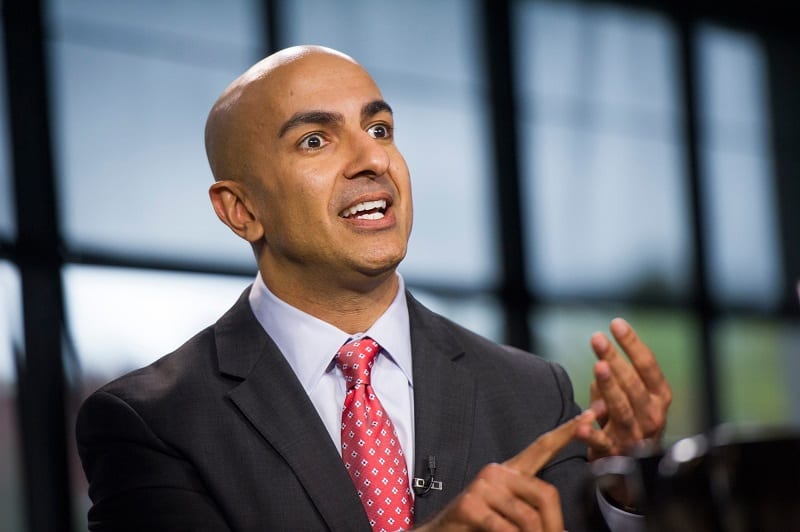Minneapolis Federal Reserve President Neel Kashkari wrote Thursday that banks should cancel dividends and sell shares to raise cash. Kashkari said these measures would be necessary to create a cash buffer going into a potentially drawn-out recession. Because should the banks fail to have enough cash on hand, a wave of defaults could trigger a financial crisis. Kashkari wrote: “The most patriotic thing they could do today would be to stop paying dividends and raise equity capital, to ensure that they can endure a deep economic downturn.” But this is ironic advice coming from a Federal Reserve official. Because hoarding cash was precisely what financial markets were trying to do last fall, that led to interest rates in overnight money lending markets between banks (called “repo” markets)
Topics:
Wesley Messamore considers the following as important: AA News, Banks, Coronavirus (COVID-19), federal reserve, Financial Crisis, Opinions
This could be interesting, too:
Chayanika Deka writes SEC Closes Investigation Into Gemini, Winklevoss Seeks Reimbursement
Wayne Jones writes CZ Criticizes Safe Wallet’s Post-Mortem on Bybit Hack
Mandy Williams writes Bitcoin ETFs Record Over .6B in Outflows in the Past 2 Weeks
Wayne Jones writes This Trending AI Token Hits New ATH After Binance Listing
Minneapolis Federal Reserve President Neel Kashkari wrote Thursday that banks should cancel dividends and sell shares to raise cash.
Kashkari said these measures would be necessary to create a cash buffer going into a potentially drawn-out recession. Because should the banks fail to have enough cash on hand, a wave of defaults could trigger a financial crisis.
Kashkari wrote: “The most patriotic thing they could do today would be to stop paying dividends and raise equity capital, to ensure that they can endure a deep economic downturn.”
But this is ironic advice coming from a Federal Reserve official. Because hoarding cash was precisely what financial markets were trying to do last fall, that led to interest rates in overnight money lending markets between banks (called “repo” markets) spiking to 10% in September.

The Fed Encouraged Banks to Take On Excessive Risk
The Fed immediately stepped in and began furiously pumping cash into the banking system through the repo markets. Fed Chair Jerome Powell refused to admit that the central bank was engaging in a fourth round of Quantitative Easing. But between September and February, the Fed pumped $78 billion a month into banks. The last round of QE3 in 2012 was “only” $40 billion a month.
The spiking interest rates were a market signal for banks to hoard their cash. But the signal was intentionally jammed. It got washed out in an intervention, by a central authority, with unlimited power to create money.
The flood of $78 billion in cash, created out of thin air, sent a different signal to banks by the Fed. The signal was: Don’t hoard your cash. There’s plenty of cash. Everything’s fine. Keep doing what you’re doing.
So markets did, and stock prices continued to set one new record after another from October to February. But all on false confidence and artificial credit expansion.
Crypto Hedges Against Central Banking Excess
After the 2008 financial crisis, those who learned its lessons and knew about Bitcoin bought it to hedge their savings. In under a decade, an entire industry of competing private currencies sprung up in Bitcoin’s wake. Many of them are brutally deflationary, with hard limits on the total supply of currency. For example Litecoin, Ripple, Dash, IOTA, and EOS. These are hedges against the perverse excesses of a financial regime of unlimited monetary expansion.
The traditional finance industry is centrally managed by the Federal Reserve or your country’s central bank. Their arbitrary and limitless command over the money supply has advantages and disadvantages. A disadvantage is the endless expansionary interventions to smooth out shocking market signals (like last year’s spike in repo interest rates) don’t actually help people avoid the shocks. They simply forestall a growing accumulation of these market corrections until even the central bank can’t hold off the inevitable.
And when the correction happens massively, all at once, it hits an economy and financial system full of capital misallocations that economists call a “bubble.” That’s why a hundred years of U.S. central banking has only worsened the severity of boom and bust cycles.
The 2008 financial crisis spawned the Great Recession, the worst economic contraction since the Great Depression. And the unprecedented monetary expansion in the wake of the Great Recession has led to a crisis that many economists fear will be worse than the Great Depression. To top it all off, equity owners in the banking businesses that participate in this financial system have to read Fed presidents’ op-eds calling for their dividends to be cut.
Traditional banking suffered a massive blow to its credibility in 2008. The current crisis might be the existential death blow to the finance industry. Expect big things out of crypto soon.
Disclaimer: This article is the opinion of the author, and does not represent professional financial or investing advice.
